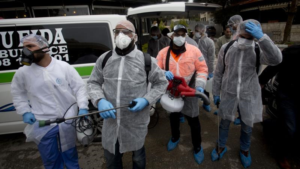Coronavirus outbreak in the time of apartheid

Palestinian workers ready to disinfect mosques and churches against coronavirus in Ramallah, 7 March 2020
Osama Tanous writes in Aljazeera:
As the number of infections and deaths from COVID-19 multiply by the day, there have been increasing calls across the world for people to show solidarity and care for each other. Yet for the Israeli government, there is no such thing as solidarity.
As soon as the first coronavirus infections were detected, the Israeli authorities demonstrated that they have no intention of easing apartheid to make sure Palestinians are able to face the epidemic under more humane conditions.
Repression has continued, with the Israeli occupation forces using the excuse of increased police presence to continue raids on some communities, such as the Issawiya neighborhood in East Jerusalem, home demolitions in places like Kafr Qasim village and the destruction of crops in Bedouin communities in the Naqab desert.
Despite four Palestinian prisoners testing positive for COVID-19, the Israeli government has so far refused to heed calls to release the 5,000 Palestinians (including 180 children) that it currently holds in its jails. And there has been no sign that the debilitating siege on the Gaza Strip, which has decimated its public services, would be lifted any time soon.
Israeli Prime Minister Benjamin Netanyahu is also trying to exclude the mostly Palestinian Joint List from the formation of an emergency unity government to tackle the outbreak, calling its members “terror supporters“.
At the same time, the Israeli authorities have been quick to depict Palestinians as carriers of the virus and a threat to public health.
In early March, when the Palestinian Ministry of Health announced it had confirmed the first seven cases of the coronavirus (which causes COVID-19 disease) in the occupied Palestinian territory, Israeli Defense minister Naftali Bennett was quick to shut down the city of Bethlehem, where all the cases were located.
Of course, the concern there was not the health and safety of Palestinians in the city, but rather the threat of them infecting Israelis. The nearby settlement of Efrat – which also had confirmed infections, of course – was not put on lockdown at that time.
